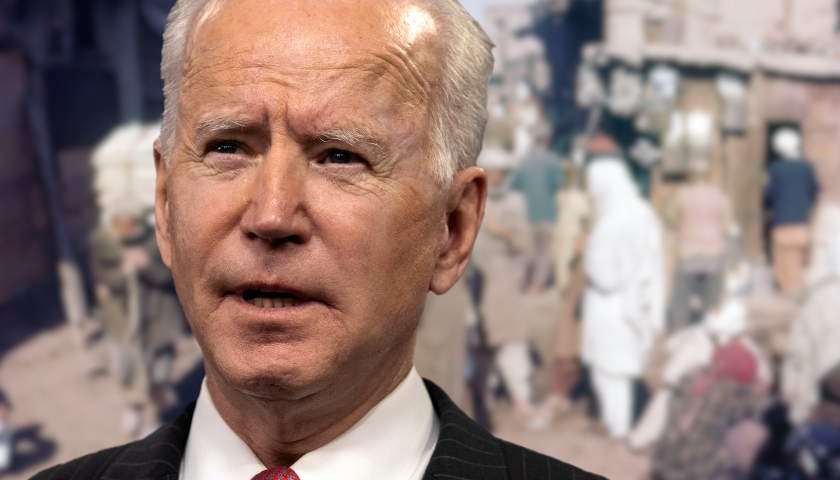by Christopher Roach
The chaotic withdrawal from Afghanistan has produced moving scenes of disorder and desperation. Some see American fecklessness. Others, the rancid fruit of attempting to cultivate Afghanistan in our image. Finally, others see the Biden Administration making a hash of what was fundamentally a good policy of planned withdrawal. Even for those who supported withdrawal—as I did—the events of the last week undeniably were emblematic of the ongoing humiliation of the United States and its military.
Defending his decisions, Joe Biden gave a surprisingly good speech, which could have just as easily come from Donald Trump or Ron Paul. But considering the circumstances, the tone was off. The speech only justified the withdrawal in general and avoided taking responsibility for its particulars, including the grim scene at the Kabul airport, for which Biden and his administration bear some responsibility. Biden defied credulity when he said, “We planned for every contingency.”
The execution of our exit falls squarely on the Biden Administration. Intelligence failed again. Choices were made about who stayed and for how long, which contributed to the melee. We shut down the alternative Bagram airfield before removing our personnel from Kabul. Before and after these events, Biden was on vacation. Which generals and senior advisors will be fired on account of these mistakes?
Biden neither acknowledged nor justified his own decision to ignore the deadlines set by last year’s withdrawal deal, signed by the Trump Administration. This almost certainly made matters worse. Biden claimed a few weeks ago that the Afghans were a capable and credible force that would continue to fight for their country. Instead, they were cowardly and incompetent.
That said, Biden does deserve some credit for sticking to his guns. After all, the ultimate triumph of the Taliban was probably inevitable. Too many critics are obsessing over the current and temporary chaos, which arose primarily from the underlying weakness of our Afghan “partners,” decades in the making.
Oddly enough, the rough-looking Taliban appear to have thought about how to handle this collapse with much more strategic forethought than our own best and brightest.
The Chaotic Withdrawal Is Emblematic of the Afghan Reality
Focusing too much on the particulars of the withdrawal avoids asking deeper questions about our nation-building strategy in Afghanistan. The strategy depended on a fiction: that we were standing up a popular and democratic Afghan government, which was protected by a capable and patriotic Afghan military.
This fiction was supported by many small lies about Afghan security capabilities spawned by the larger philosophical error of liberal universalism. This theory says that there is one right way of government, that everyone can adapt to it and wants it, and that it can be imposed by force of arms because it is natural. None of this is true.
In every way, we tried to make Afghanistan into our mirror image. This included training and equipping an army that functioned like ours, one dependent upon contractors, a long logistical tail, as well as satellite reconnaissance and airplanes. This was all unnecessarily expensive and fragile, as the goals of domestic security could have been secured by motivated men in pickup trucks and AK-47s, as the Taliban so ably demonstrated.
After the initial shock of recent events, the Beltway’s uniparty consensus is now coalescing on a few key themes. Members of both parties are criticizing the withdrawal in general, some are focusing only on very specific details such as timing and logistics, some are saying Biden squandered a worthwhile effort that could have succeeded with a “conditions-based withdrawal,” and, worst of all, some are blaming the American people for ignoring a war that our country’s leaders mostly ignored for 20 years.
This is all grotesque.
The reality of Afghanistan implicates the experts, the generals, the profiteers, and the leadership of both parties. Rather than being an exceptional end to an otherwise successful campaign, recent events reveal the flawed strategy that preceded them. The swift collapse exposes the Potemkin village reality of the Afghan government, which we have supported at great expense for two decades.
Having failed spectacularly in Afghanistan, both parties are now committed to letting in armies of Afghan refugees as a kind of “liberal do-gooder” consolation prize.
A False Concept of National Honor
Refugee advocates reason that even though we could not turn Afghanistan into a functioning liberal democratic country—in part because of the vast cultural gulf between our peoples—we should bring into our homeland all the dysfunctional men who made up its dysfunctional national security apparatus, and somehow this will all work out.
I say men deliberately. The Kabul airport is full of military-age men, whose courage only extends to their heroic efforts to get on the planes. Why didn’t any of these thousands of able-bodied men pick up a gun and fight for their country?
The fate of Afghan military personnel is not a question of our national honor. We were not liberating a foreign country or engaged in a colonial war with some long-held possession. Afghanistan belongs to the Afghans. We didn’t take the entire population of France or the Philippines to the United States after they fell to the Axis powers. We have no obligation to do something similar now.
Even accepting the general premise that we owe something to those who may be particularly endangered for helping the United States, how far does this obligation extend? Translators embedded with our troops are one thing. But what about the many thousands of Afghan soldiers, police, local officials, and contractors who did everything from cook food to build roads? What about those who our soldiers had to watch out of the corner of their eye to parry repeated “green on blue” attacks? Are these people all now our obligation?
Camp followers, mercenaries, and self-interested hustlers are part of every war. They don’t thereby become America’s problem, owed priority on outgoing flights equal to American citizens.
– – –
Photo “Joe Biden” by U.S. Secretary of Defense. CC BY 2.0. Background Photo “Kabul, Afghanistan” by manhhai. CC BY 2.0.








